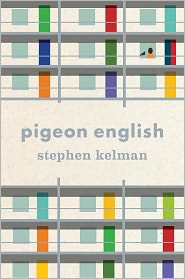Pigeon English
by Stephen Kelman
While I can’t say that Stephen Kelman’s novel Pigeon English was a whole lot of fun to read, I don’t regret having made the effort. Elements of the novel can be challenging and/or tedious, but by the time you reach the end it packs a powerful punch.
The novel opens with a body on the ground, a murdered child, never identified beyond “dead boy.” It is being gazed upon by 11-year-old Harrison Opuku, our first-person narrator and torturer of the English language. Harri is a recent emigrant from Ghana. He’s come to the London with his mother and older sister, while his father saves money back home to bring over the rest of the family. And Harri seems to be adapting well. He’s made friends and, for better or worse, is adapting to the prevailing culture.
Harri and his best friend, Dean, decide they’re going to investigate dead boy’s murder. Dean’s seen many episodes of CSI, so he knows how it’s done. This “investigation” is a loose thread throughout the novel, which takes place over the course of several months. But mostly Pigeon English is the Harri show. And Harri is as sweet and endearing a character as I’ve read in quite some time. He’s smack in the middle of the London projects, stabbings and AIDS and junkies are a part of his daily reality, and yet, somehow, he is an innocent. And he is in peril. The seduction of the street gangs is just one of the many threats the adult reader sees looming over the young man. And it’s painful to read. Still, there is a lot of humor salted throughout the novel.
Another narrative element is Harri’s affection for a pigeon that flies into their flat one day. Harri explains, “I just wanted something that’s alive that I can feed and teach tricks to.” A pet pigeon isn’t in the cards, but Harri keeps an eye on him. The pigeon, it seems, keeps an eye on Harri as well. Throughout the novel are brief interludes from the pigeon’s point of view as he watches over Harri. These are some of the most beautiful passages. Ironically, the pigeon’s English is flawless.
As sweet, imaginative, and funny as Harri is, reading an entire novel in his voice is a challenge. For starters, he has a very limited vocabulary. Despite his assertion that in “England there’s a hell of different words for everything,” he tends to use the same handful. Some are recognizably English—though I’ve never seen anyone so often “vexed” as he is. Other words are more open to interpretation. I think the frequent exclamation “Asweh” is “I swear.” An angry person is “red-eyes.” “Bo-styles” means cool. A long time is “donkey hours.” A tricky person is a “confusionist.” And most mysterious of all was the word “hutious,” used in so many different contexts that I’m left to conclude that it bears a grammatical resemblance to “supercalifragilisticexpialidocious.”
Thankfully, this is a short novel, and the language can be dealt with. When I finally got to the end, I can’t honestly say that I didn’t see it coming. Still, it was a shock. Or perhaps the shock was just how much of an emotional wallop it packed. And ultimately, that’s why I rate this novel a success—because by the end, I cared deeply about this child.



No comments:
Post a Comment